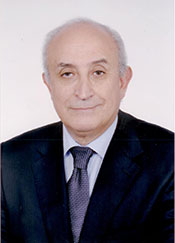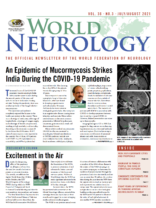By Prof. Mustapha El Alaoui-Faris, WFN Rabat Training Center

Mustapha El Alaoui-Faris
After the accreditation of the Rabat Training Center in September 2013, the WFN signed a contract with the Mohammed V University of Rabat to train neurologists from Sub-Saharan Africa in Morocco. It was decided to start with complementary training in clinical neurophysiology for neurologists who have already completed their studies. They receive a grant of 13,000 Euros from the WFN covering travel and living expenses in Rabat for 10 months. The internship includes training in the performance and interpretation of EMG and EEG and in the management of patients suffering from neuromuscular diseases or epilepsy.
During their training, neurologists participate in the various teaching activities of the Department of Neurology of Rabat and attend the meetings of the Moroccan Society of Neurology in Morocco and in the Maghreb. Neurologists from Burkina Faso, Chad, Guinea, Madagascar, Mali, and Senegal have benefited from this training, which has allowed them to consolidate their EMG and EEG practices. In this regard, I would like to thank Prof. Reda Ouazzani, head of the clinical neurophysiology department, and his team, in particular Prof. Nazha Birouk, for their commitment and their availability during the African neurologists’ internship.
During the eight years of training for French-speaking African neurologists, the Rabat Center has received eight diligent trainees committed to expanding their knowledge and improving their expertise. They all have a good knowledge in general neurology, whatever their country of origin. This is due to the heritage of excellence of the French neurological school in these countries.
Currently, 14 French-speaking countries organize training of neurologists on-site, but due to lack of financial resources, they only train one to five neurologists per cohort. At this rate and given the glaring lack of neurologists in sub-Saharan Africa (barely 0.03 neurologists per 100,000 inhabitants, whereas the WHO calls for 1/100,000), it would take decades to reach a sufficient number of neurologists in these countries.
It is therefore important to explore the different possibilities to increase the number of neurologists in sub-Saharan Africa, while being aware that the majority of African neurologists trained in Europe and North America do not return to their countries.
Currently, the WFN has four accredited training centers in Africa, each center receives approximately one neurologist per year, often for additional training. Alternatively, neurologists can be trained in their own countries with the possibility that the last year of training be done in a training center approved by the WFN in Africa. This might be cost-effective for French-speaking African countries with good neurology training centers and affordable costs of living.
At the Rabat Center, we are willing to provide full training in neurology (4 years), in addition to continuing the annual training in clinical neurophysiology sponsored by the WFN and by the ICNMD Congress.
To ensure continuing education of French-speaking neurologists, the WFN in collaboration with the African Academy of Neurology (AFAN) can organize virtual courses in neurology in French. The courses could be made available on the WFN website. The lack of neurologists in Africa will not be filled any time soon, so it would be desirable in the era of video conferences that the WFN could provide education on “neurology for non-neurologists” for general practitioners in sub-Saharan Africa.
Finally, to accelerate the training of African neurologists, it would be desirable for the WFN to develop a true “Alliance for Neurology in Africa” by involving the AAN, the EAN, and other partners of the World Brain Alliance for its financing. This will improve the care of millions of African patients suffering from neurological disorders. •
